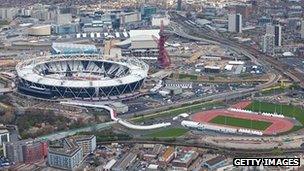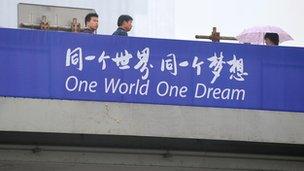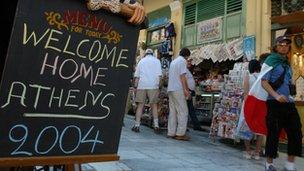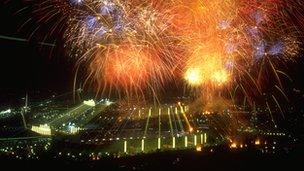 | |
| Host city | Tokyo, Japan |
|---|---|
| Nations | 93 |
| Athletes | 5,151 (4,473 men, 678 women) |
| Events | 163 in 19 sports (25 disciplines) |
| Opening | 10 October |
| Closing | 24 October |
| Opened by | |
| Cauldron | |
| Stadium | National Stadium |
 Republic of China (40)
Republic of China (40)
2020
TBD常指「有待討論(To Be Discussed)」、「有待完善(To Be Done)」、「有待定義(To Be Defined)」及「有待決定(To Be Decided或To Be Determined)」。
London 2012: Olympic mottoes of previous Games

Games organisers have announced the motto of the London 2012 Olympics will be "Inspire a generation".
The slogan reflects one of London's key Olympic legacy pledges - to inspire a generation of young people to take part in local volunteering, cultural, and physical activity.
The official Olympic motto is taken from the Latin "Citius, altius, fortius" - which means "Faster, higher, stronger", and was proposed by the man considered the founder of the modern Olympics, Pierre de Coubertin, on the creation of the International Olympic Committee in 1894.
It was introduced at the 1924 Olympics in Paris. Since 1988, host cities have adopted their own motto.
So how does London's slogan compare to those of previous Games?
2008: Beijing, China
"One world, one dream"

Organisers said the logo reflected the essence of the Olympic values - unity, friendship, progress, harmony, participation and dreams.
Simple in expression, but profound in meaning, it was also said to reflect the core concepts of the Beijing Olympics - "green Olympics, high-tech Olympics and people's Olympics".
In Chinese, the word "tongyi" - or "the same" - is used for the English word "one". Organisers said this highlighted the idea that "mankind lives in the same world and seeks for the same dream and ideal".
2004: Athens, Greece
"Welcome home"
2004 marked the first time since 1896 that the Olympics had been held in Greece - the site of their ancient incarnation, which the host country acknowledged with its simple slogan: "Welcome home".

The Games honoured the host nation's history and culture, its proud place in the traditions of the Olympic Movement, and its distinct connection to the Olympic ideals.
For nearly 12 centuries from 776BC, the ancient Olympic Games were staged on the plains of Olympia.
Games organisers said the celebration came to occupy an important position in the Greek world, embodying a foundation of universal ideals - the values of noble competition and the effort to combine body, will and mind in a balanced whole.
2000: Sydney, Australia
"Share the spirit"
Australia's slogan in 2000 hoped to highlight the inclusive nature of the Games, turning Sydney into a multicultural utopia for the masses.
But the motto became a hostage to ambush marketing by national airliner Qantas, which started a marketing campaign using the image of Australia's favourite athlete Cathy Freeman with the slogan "the Spirit of Australia".
This prompted Ansett Air, the Games' official airline, to bring legal proceedings that were later settled.
1996: Atlanta, USA
"The celebration of the century"
At Atlanta 1996, home hero Michael Johnson achieved a 200m and 400m double, 35-year-old Carl Lewis picked up his ninth gold in four Games by winning the long jump and Kurt Angle won the wrestling with a broken neck.
The Olympic flame was movingly lit by Muhammad Ali, and two people died when a lone bomber set off a device in Centennial Olympic Park.
But these celebratory highlights for the last Games of the 20th Century were overshadowed by the transport debacle at the Games. Athletes got shouted at by officious security officials and were delayed getting to events because bus drivers got lost.
1992: Barcelona, Spain
"Friends Forever"

The motto of Spain's Olympics in 1992 was encapsulated by the dulcet tones of Sarah Brightman & Jose Carreras in their duet Amigos Para Siempre, sung at the Games' closing ceremony.
Another anthem used at the Games was Barcelona, composed five years earlier by Freddie Mercury and sung as a duet with Montserrat Caballé.
It had been hoped the pair would perform the song at the opening ceremony, but Mercury died before the start of the Games, so a recording of the song was played instead.
1988: Seoul, South Korea
"Harmony and progress"
In picking its slogan for the 1988 Games, South Korea said the creation of a peaceful world - a primary goal of the Olympic Movement - was also the unwavering and historic desire of the Korean people.
Organisers said they were committed to making the Games a joyful festival in which many cultures of the world could join in harmony with the country's own 5,000-year-old culture.
沒有留言:
張貼留言